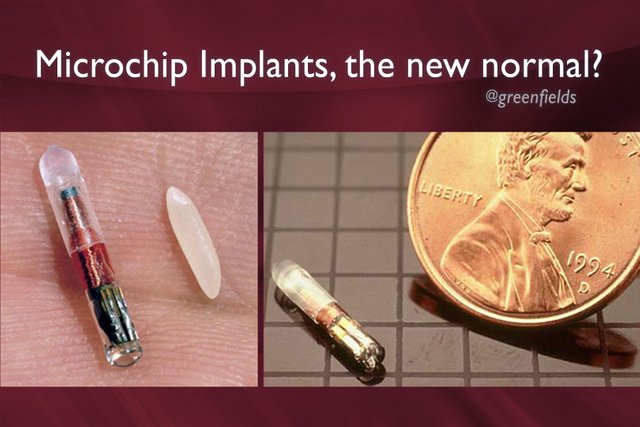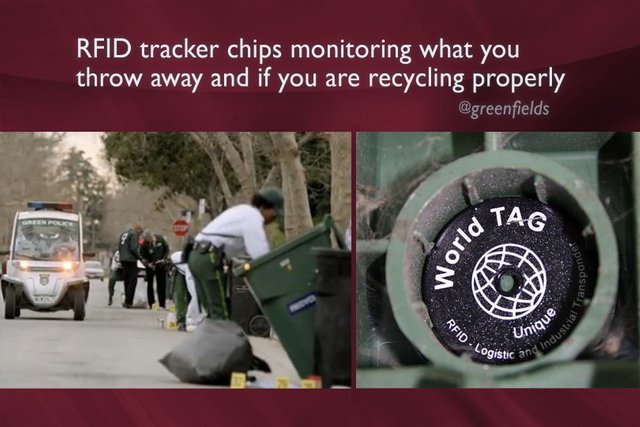Mark my words!
The majority of world citizens behave like an ignorant stampeding herd of Bulls, unaware of the upcoming ravine. Jonathan Greenfields
Tracking convenience?
How would you feel about having a microchip implanted in your hand to make things more convenient at work? In Sweden, some workers are actually volunteering to do just that, electing to have a chip the size of a grain of rice implanted in their bodies to help them unlock doors, operate printers, open storage lockers and even buy smoothies with the wave of their hand, according to an Associated Press report. Epicenter, a digital hub in Stockholm that houses more than 300 start-ups and innovation labs for larger companies, has made the implanted chip available to its workers and to member organizations in recent years. It's a biohacking experiment in simplicity that's been embraced by some early adopters associated with the center but represents a technological frontier sure to make others shudder.
Those leading the experiment in Sweden say it's an entirely voluntary exercise intended simply as a technological test for convenience. “It's very early to try to depict where this is going,” Patrick Mesterton, co-founder and chief executive of Epicenter, said in an interview with The Washington Post. “We're just doing this because it’s interesting. We want to play around with technology.”
The promise behind the implant being offered at Epicenter is efficiency. People who get “chipped” — the same technology used to track pets or deliveries — can replace key cards, employee badges and credit cards for certain functions at the facility with technology that can't be lost or left behind.

C.R. Wright, a partner with the employment law firm Fisher Phillips in Atlanta, said technology such as fingerprint or hand scans have become more popular as a way to avoid forgotten badges, prevent workers from “buddy punching” the clock, and secure particularly sensitive or secretive facilities. “We already have biometric tags and packaging. It's jumping to the human application,” he said. Though any kind of embedded microchip is likely to bring pushback from workers, “within the next five years, I would think it will be tried here.” [source - Washington Post, April 4, 2017]
RFID and GPS chip implants
RFID tags are used in many industries, for example, an RFID tag attached to an automobile during production can be used to track its progress through the assembly line; RFID-tagged pharmaceuticals can be tracked through warehouses; and inplanting RFID microchips in jivestock and pets allows for positive identification of animals.
Since RFID tags can be attached to cash, clothing, and possessions, or implanted in animals and people, the possibility of reading personally-linked information without consent has raised serious privacy concerns. These concerns resulted in standard specifications development addressing privacy and security issues. Theoretically, a GPS-enabled chip could one day make it possible for individuals to be physically located by latitude, longitude, altitude, speed, and direction of movement. Such implantable GPS devices are not technically feasible at this time. However, if widely deployed at some future point, implantable GPS devices could conceivably allow authorities to locate missing persons and/or fugitives and those who fled from a crime scene. Critics contend, however, that the technology could lead to political repression as governments could use implants to track and persecute human rights activists, labor activists, civil dissidents, and political opponents…. [source - Wikipedia, the free encyclopedia]
Will in the end all people, great and small, rich and poor, free and slave, be forced to receive a mark on their right hands or on their foreheads?

Big Brother mark in your trash can?
High-tech garbage carts with RFID chips force recycling or pay $100 fine
It would be a stretch to say that Big Brother will hang out in Clevelanders' trash cans, but Ohio plans to sort through curbside trash to make sure residents are recycling - and fine them $100 if they don't. The move is part of a high-tech collection systeem the city will roll out next year with new trash and recycling carts embedded with radio frequency identification chips and bar codes. The chips will allow city workers to monitor how often residents roll carts to the curb for collection. If a chip show a recyclable cart hasn't been brought to the curb in weeks, a trash supervisor will sort through the trash for recyclables.” [source - cleveland.com and business insider 2010]

Your device tracking your every move?
Mobile phones and tablets are, fundamentally, just small computers that we carry around in our bags and pockets. But although we carry these computers more often and closer than traditional laptops, and although they are equipped with sensors to record many aspects of our lives, their hardware and operating systems have been designed to give us very little insight and control over them.
EFF is fighting to protect mobile location data from government surveillance; campaigning to prevent Google, Apple and other mobile OS makers from seizing inappropriate and anti-competitive control over mobile software development; fighting against DRM technologies that prevent users from modifying the software on phones and tablets they've purchased and holding telcos accountable for their invasions of user privacy and violations of network neutrality. [source - Electronic Frontier Foundation 2017]
Be save Steemers, and thank you for upvoting my post!
wow, mind = blon
Thank you @aakashsinha, much appreciated...
Thanks 😄